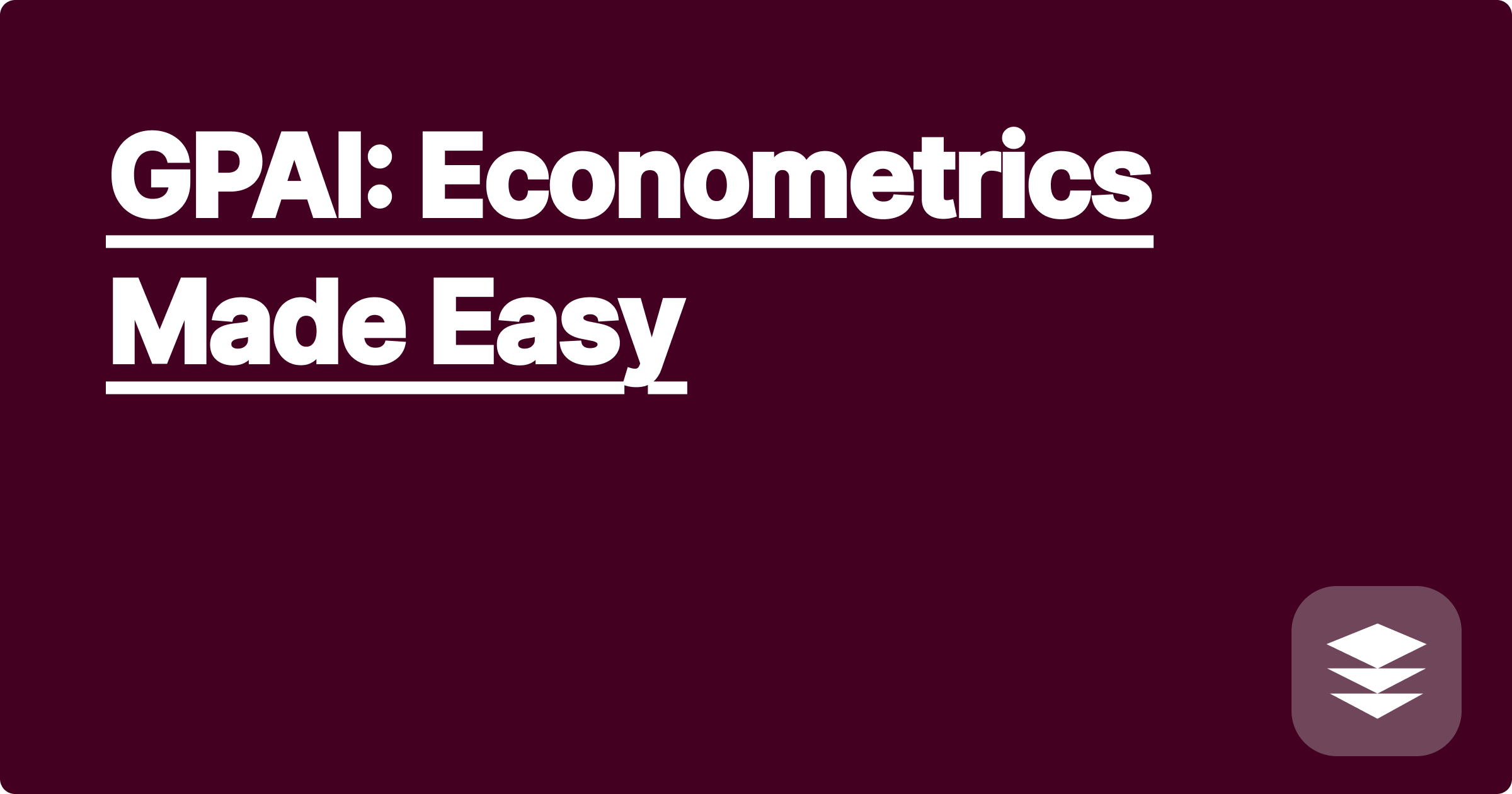
STEM fields often present complex challenges, particularly in areas requiring extensive data analysis and modeling. Econometrics, a branch of economics that uses statistical methods to analyze economic data, is a prime example. Many students and researchers struggle with the intricate mathematical concepts and the technical skills required to perform econometric analysis. Fortunately, the rise of Generative Pre-trained Transformer (GPT) models and other AI-powered tools offers a promising new approach to simplify these complex tasks and make econometrics more accessible.
For STEM students and researchers, mastering econometrics is crucial for understanding and interpreting economic phenomena. It’s a fundamental skill for conducting research, developing economic models, and informing policy decisions. The ability to leverage AI tools in econometrics can significantly enhance productivity, improve understanding of complex concepts, and facilitate more sophisticated analysis. This empowers students to tackle challenging problems and researchers to explore new frontiers in their respective fields.
Econometrics involves the application of statistical methods to economic data to test and develop economic theories. This process often requires a deep understanding of statistical concepts like regression analysis, hypothesis testing, and time series analysis. Students and researchers often face difficulties in formulating appropriate econometric models, selecting the right statistical tests, and interpreting the results of their analysis. The complexity of software packages like R or Stata adds another layer of difficulty, particularly for those new to coding. Furthermore, real-world economic data can be messy and require extensive cleaning and preprocessing, which can be time-consuming and error-prone. These challenges can be daunting and often discourage students from pursuing advanced econometric studies.
AI tools like ChatGPT, Claude, and Wolfram Alpha provide powerful resources for simplifying econometric analysis. These tools can be used to understand complex concepts, generate code for statistical analysis, interpret results, and even formulate research questions. ChatGPT and Claude excel at explaining complex topics in a conversational manner, breaking down intricate statistical concepts into easily digestible explanations. Wolfram Alpha, with its computational prowess, can perform complex calculations, generate visualizations, and provide step-by-step solutions to mathematical problems. By leveraging these tools, students and researchers can overcome the technical hurdles often associated with econometrics and focus on the underlying economic principles.
Begin by clearly defining the econometric problem you want to address. This might involve formulating a research question, identifying the relevant variables, or specifying the type of econometric model you intend to use. Next, engage with an AI tool like ChatGPT or Claude. Describe your problem in detail and ask specific questions related to the concepts, formulas, or code you need. For instance, you could ask ChatGPT to explain the difference between ordinary least squares and generalized least squares regression or request a code snippet in R for performing a specific statistical test. Once you have the necessary code or formulas, use Wolfram Alpha to perform calculations, generate visualizations, or verify your results. Wolfram Alpha can also be used to explore different statistical distributions and understand their properties. Iterate this process, refining your questions and exploring different approaches until you arrive at a satisfactory solution.
Consider a scenario where you want to analyze the relationship between education level and income. You could use ChatGPT to understand the concept of regression analysis and how to apply it in this context. You might ask, "How can I use regression analysis to determine the impact of education on income?" ChatGPT can provide an explanation of the relevant concepts, including the dependent and independent variables, the regression equation, and the interpretation of coefficients. Then, you can request a code snippet in R to perform a linear regression. You could ask, "Generate R code for a linear regression with income as the dependent variable and education level as the independent variable." After obtaining the code, you can use Wolfram Alpha to calculate the regression coefficients, the R-squared value, and other relevant statistics. You could input the regression equation directly into Wolfram Alpha and receive a detailed analysis.
Another example involves analyzing time series data, such as stock prices or inflation rates. You could ask ChatGPT to explain the concept of autocorrelation and how to test for it. You could then ask for Python code to perform an Augmented Dickey-Fuller test. After running the code, you can use Wolfram Alpha to visualize the time series data and interpret the results of the test.
To maximize the benefits of AI in econometrics, focus on developing a strong understanding of the underlying economic principles. AI tools should be used to supplement, not replace, your understanding of the subject matter. Actively engage with the AI tools by asking specific and well-defined questions. Experiment with different prompts and explore various approaches to problem-solving. Always critically evaluate the output generated by the AI tools and compare it with your own understanding and intuition. Finally, remember to cite the AI tools appropriately in your academic work, acknowledging their contribution to your analysis.
In conclusion, AI tools offer a powerful new approach to learning and applying econometrics. By leveraging these tools effectively, STEM students and researchers can overcome the technical challenges associated with this field and gain a deeper understanding of economic principles. Embracing these technologies will not only enhance your academic performance but also prepare you for the increasingly data-driven world of economics and finance. Start exploring these tools today and discover the transformative potential of AI in econometrics.